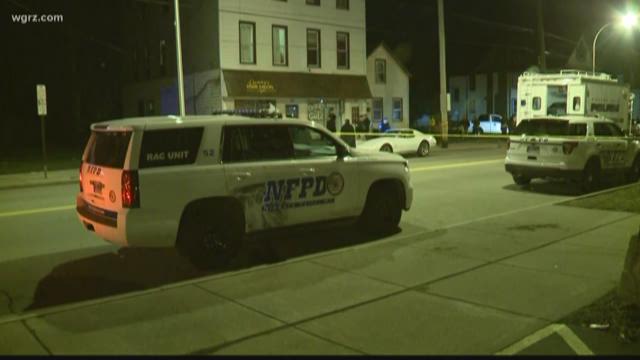NIAGARA FALLS, N.Y. — Council members on Thursday salvaged two police detective positions in their final 2018 budget but approved cuts to two other patrol jobs, symbolic of a larger effort to reduce costs in the face of major financial stress.
In the final stage of the budget process, the council approved roughly two dozen amendments to override vetoes by Mayor Paul Dyster, essentially defying his attempts to save numerous city positions, programs and services. The council's cuts will free up hundreds of thousands of dollars for the city, which faces a severe budget shortfall due in large part to uncertainty in Seneca Nation casino revenues.
Although the council's decisions will impact numerous departments, the fate of the four police positions arguably garnered the most attention in the budget. The mayor had attempted to preserve all four positions, which will come open through retirements.
If not for a critical vote by Kenny Tompkins, the council's lone Republican, Niagara Falls Police would have lost all four.
But Tompkins ultimately voted to restore the two detective jobs.
"I thought it was fair to do it half-and-half," Tompkins said. "Split it in the middle."
Tompkins said cutting the detective positions would have complicated the police union contract, which calls for them to be filled.
Police Chief Bryan DalPorto was pleased to see the detectives restored, but he said losing two patrol jobs will severely hamper his department's ability to fight crime. It may also leave the department unable to send officers to certain events around the city, which could hurt officers' relationships with community members.
"It's very disappointing they didn't restore all the positions. It's disappointing they cut them in the first place," DalPorto said. "They know the tasks these officers face on the street every day. It should be no surprise to them. But they chose to do it anyway."
Tompkins called the decision "very tough" in an interview after Thursday's special meeting.
Besides police, the council defied the mayor's wishes and eliminated nearly a half-dozen other city positions, such as the management information systems director. Council members also solidified cuts to a police training program and city overtime costs, among other services.
The final tax impact in 2018 will be a 2.2 percent tax hike for residential properties and a 6.5 percent hike for business and commercial properties. Those are lower figures than the mayor's original proposal, which included a 2.6 percent residential increase and a 14 percent hike for businesses.
"I definitely think it helps the business owners in the city, because we lowered the tax rate considerably. As far as helping the people, you've got a little bit of an upgrade on the residential side," Tompkins said. "But the bottom line is, the mayor should have made a lot more cuts."
But in an interview at his office late Thursday afternoon, Dyster warned council members not to put the city in a position where it might need to ask for a huge tax increase down the road. The council's decision to lower the residential and commercial tax hikes will cost the city much-needed revenue, Dyster said. The mayor favors slight, incremental tax increases that would avoid overwhelming taxpayers.
He pointed out that no residential taxpayers spoke out against his proposed tax increase during budget hearings.
"I wish council had raised some additional revenues this year, in light of circumstances that we face. Yes, I do," Dyster said. "I think the political environment was permissive of that."
In his interview, Dyster also once again addressed the situation between the Seneca Nation and the state. He expects a resolution at some point during the first half of 2018 as the arbitration process continues between the two sides.
The casino revenue issue, while important, is not the only lingering concern about future budgets.
"The preparation for next year's budget process (2019) has to start immediately. We've said that-- we're looking at a two-year plan, so we're going to have council members in here and we're gonna say, 'OK, here's where we stand after the actions you've taken,'" Dyster said, "and start outlining for them at the earliest possible opportunity the choices we can already see they're going to face, putting together the 2019 budget."

